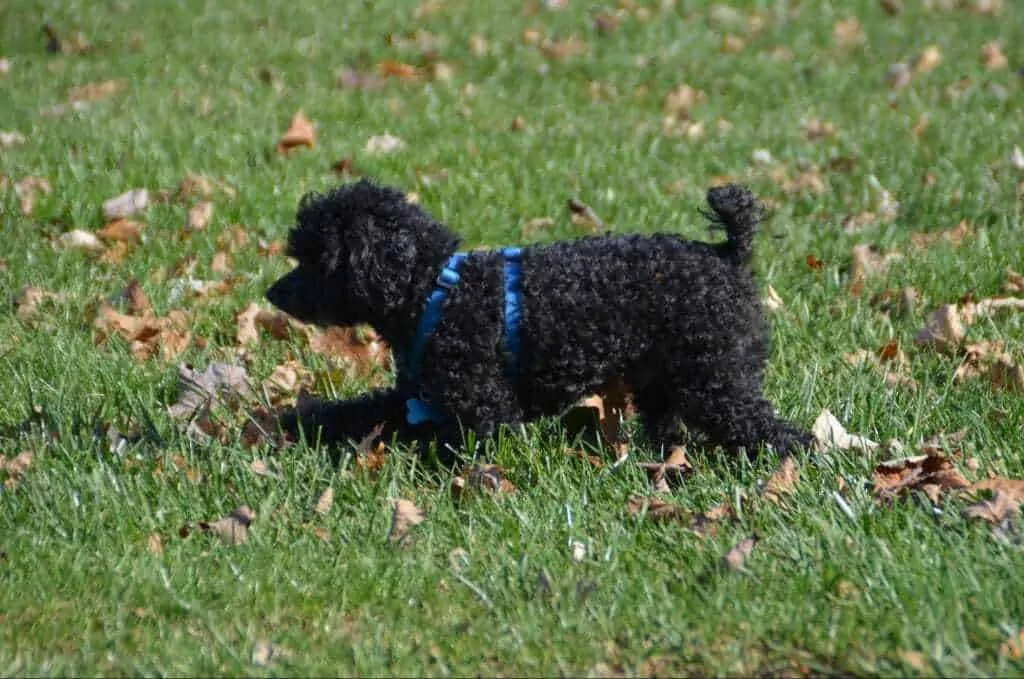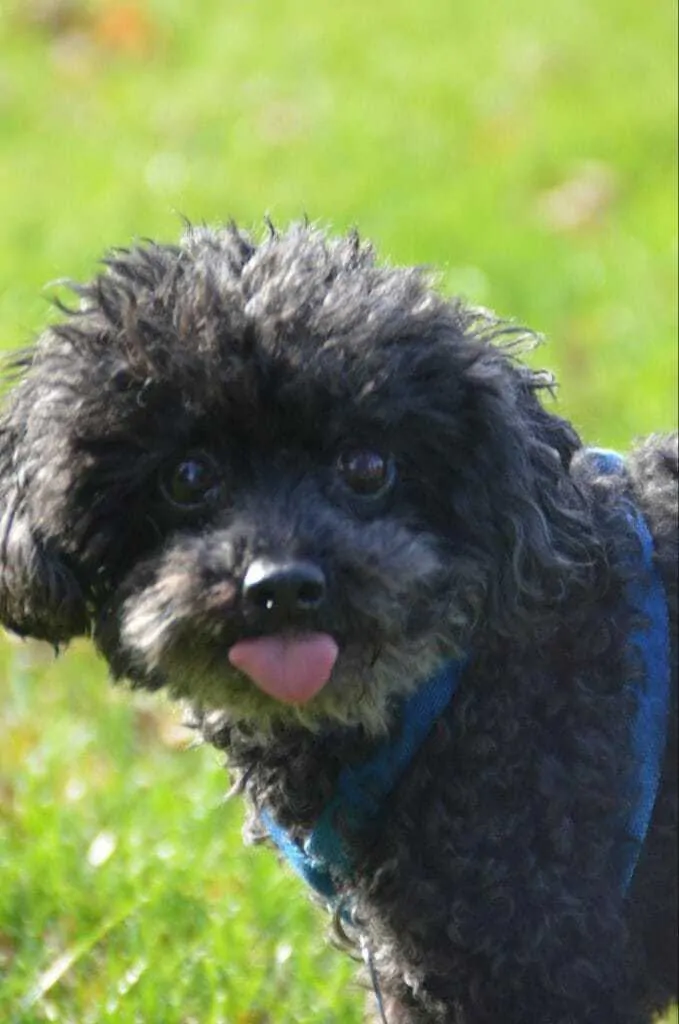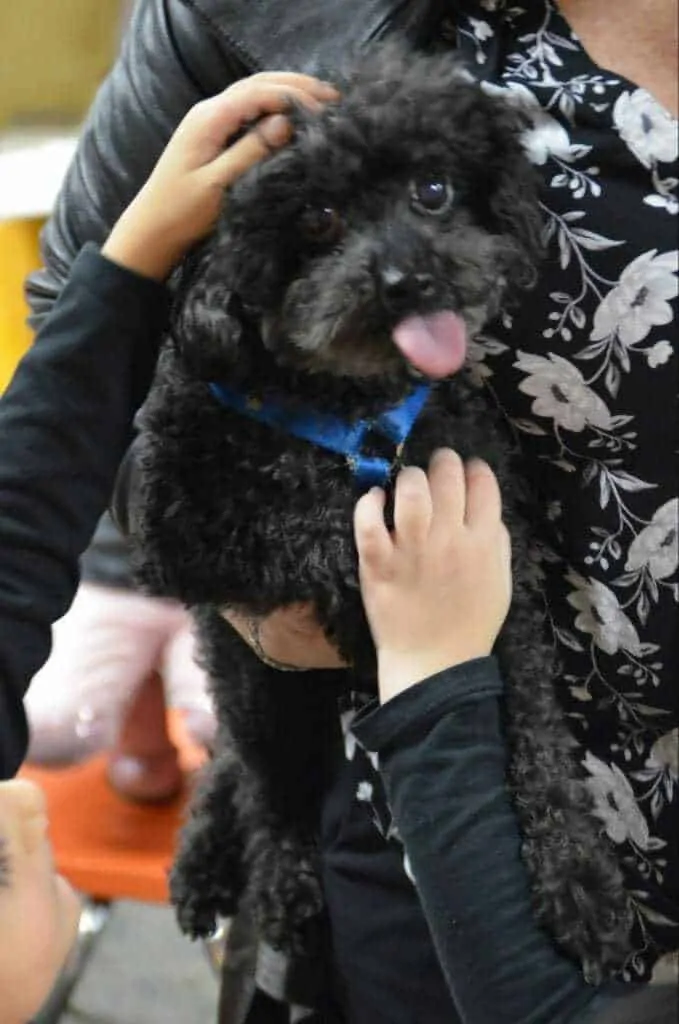Whoever said “good things come in small packages” must have owned a Teacup Poodle.
These little dogs have captured the hearts of dog owners everywhere and their popularity is on the rise. The teacup poodle has the same temperament and personality as a standard poodle or miniature poodle, but in a much smaller package.
Here’s what you need to know about the Teacup Poodle if you’re considering making one a member of your family. In this teacup poodle breed information guide we address what you need to know about how to train them, behavior characteristics, common health issues and more.
- Height: 9 inches – 10 inches
- Weight: 6 pounds or less (typically 3 – 5 pounds)
- Coat Colors: Only solid colors including black, blue, silver, gray, red, white
- Health Problems / Health Conditions: Progressive Retinal Atrophy
Contents
Teacup Poodles are teeny.
The unofficial breed standards say that a Teacup Poodle can be no more than eight inches tall and weigh no more than four pounds. Given that the average weight of a newborn is 7 ½ pounds, it basically means your Teacup poodle will never be as big as the smallest baby you’ll hold.
Max is a Teacup Poodle who was the biggest of his litter. He actually weighs closer to the Toy Poodle size but is still very small, and just loves a good romp outside like many toy poodles.
These little dogs come with a big price tag.
If you’re searching for a teacup poodle, get ready to pay some big bucks for the little guy or girl. Breeders charge anywhere from $1,000-$2,500 for poodle puppies.
Teacup Poodles are not a formally recognized breed by the AKC.
The Standard, Miniature, and Toy Poodles are all official breeds recognized by the AKC. The Teacup Poodle is not. However, as we already noted, there are unofficial standards that poodle breeders use to classify Teacups. In reality, they are similar to the toy poodle and considered to be the tiniest version of a Toy Poodle.
Get ready to groom.
Even small dogs like these need to have their fur groomed. The good news about their beautiful curly fur is that it sheds very minimally, which means this might be a good breed for people who have allergies. However, their coat can be considered high maintenance. It requires grooming every 4-6 weeks to prevent matting, and it needs to be combed during the weeks in between groomings.
Standards and even Miniature Poodles will often have their fur shaved into unique patterns designed to protect sensitive areas but allow them to maneuver easily in water. The Teacup Poodle is too small to have that done, but the Teacup Poodle will still need its fur to be trimmed and well-maintained.
Just like humans, Max needs to have his hair cut. He goes to the groomer on a regular basis. If left ungroomed, his hair would easily matt and cause problems for him.
The Teacup Poodle is really smart.
Poodles are known for their intelligence. They are quick learners and want to please their people. With great smarts comes great responsibility, though, and that responsibility falls on the owner. Take advantage of your Toy Poodle’s intelligence and train your dog. Otherwise, you might be stuck with a little terror that adopts destructive behavior simply because he’s bored.
Max loves to show off the trick of standing on his hind legs and waiting for a treat.
The teacup poodle breed is great at doing tricks and participating in agility competitions.
Because they are so smart, they are easily trainable. They can learn to do all kinds of tricks, but this breed also does well at agility competitions. They also have a history of being circus performers precisely because of how easy it is to train them. If you have fallen in love with this breed but aren’t willing to take the time to train a dog, find someone who will do the training for you. Even tiny Teacups can learn to do some pretty big tricks.
The teacup poodle loves to retrieve prey from the water for their owners.
Poodles have been hunting ducks in Germany for hundreds of years. About 400 years ago, they began their careers as official water retrievers. All versions of the breed are great swimmers with a natural instinct to retrieve, although obviously the Teacup isn’t going to fetch you anything huge given its small stature.
Despite their origins in Germany, the teacup poodle is the national dog of France.
The poodle has become widely associated with French people and their culture over the years even though, as we noted, the breed actually comes from Germany. In France, all poodle breeds are valued highly and are called “Caniche,” which means “duck dog.”
Teacup Poodles are a natural fit for apartment living.
Given their size, they are a great dog to own if you have a small apartment or home. While they still need daily exercise, the Teacups are so small that they really won’t need much and will be more content to just be with you on the couch at home than a bigger poodle would be. Poodles aren’t naturally annoying barkers either, which adds to their apartment appeal.
Need to keep your eyes on them when this breed is around kids.
It’s not that Teacups are bad with kids; they’re definitely not. It’s just that this is such a tiny breed that a child is likely to not understand how easily he or she can hurt a dog that small. Kids are also more likely to want to pick up the dog and tote it around precisely because of its size, so any children who are around a Teacup a lot need to be taught proper behavior. Once they have that down, this dog will make a great addition to your family.
Max is well trained at being around children. He accompanies his owner to her preschool class a few times a year, and the children all gather around him and pet him under his owner’s supervision. He handles the attention and the petting very well.
Dogs this size can come with health issues.
Micro breeds (the smallest of the small dogs, like the Teacup Poodle) can have lots of inherent health problems. Sometimes their tiny bodies can create big issues for them as they stall out in adulthood at such a small size. For poodles, the problems can range from eye issues to hip dysplasia to orthopedic issues with their kneecaps. As always, getting your dog from a reputable breeder who can show proof of a healthy bloodline is a good start to having a healthy dog who lives a longer life.
Watch what Your Teacup Poodle eats.
For most dogs, good nutrition starts and often ends with a high-quality dog food. Teacups are an exception to that. You really will want to check with your vet to see what foods are recommended for these tiny dogs. Because they are so small, you should be extremely careful about treats and overfeeding. Obesity is problematic for all dogs, but for such tiny ones, it can be especially dangerous to their health.
These tiny dogs are truly people pleasers at heart. If you have a heart for them and the time to train them and care for them, consider welcoming one into your home!



